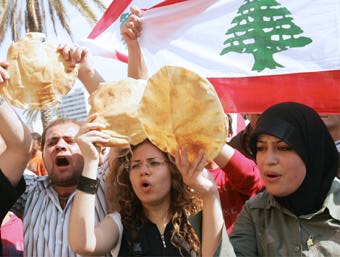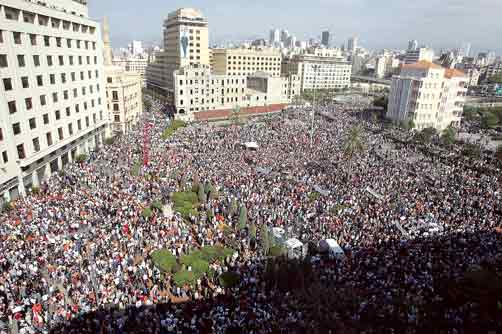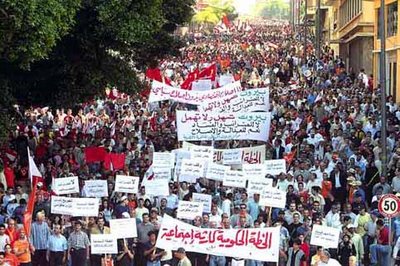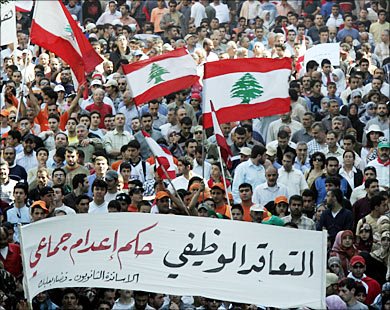



Those demonstrations in Beirut: they will never end. But the demonstrators in Beirut today are at a disadvantage. International media (especially those of France and US) mostly follow the clues and hints of their governments and as a result, will not be glamorizing the demonstrators as long as their demonstrations don’t validate the Bush Doctrine. Even the Nation magazine glamorized the Hariri demonstrators last year; the US media was quite pleased with the “telegenic” crowd, as a MERIP writer observed. Today, it was a new mix: Christian and Shi`ite demonstrators hiding behind legitimate unionist protests, motivated by real socio-economic grievances. But if you abhor the narrow sectarian divides of Lebanon, you have to say, as I said about the massive Hummus and March 8th demonstrations of last year, that today’s demonstration was also a sectarian demonstration, at least in composition, if not in the motives of the political participants. There is much to protest about this cabinet and its so-called “reform”—how much I hate that word--agenda, formulated by bureaucrats of the World Bank, and not by their tools in the Lebanese Hariri cabinet—in fact the two Ministers who “formulated” the “reform” plan (ministers of finance and economics) both were in previous stints at the World Bank, and both are Hariri Inc functionaries. The so-called “reform” package is a horrific aggressive capitalist package that Rafiq Hariri tried to impose on Lebanon, to no avail; he could not even impose it when he tried to use Syrian military muscle to get his way. This was the time when he told those who protested his cruel economic policies that the poor should not dream of buying new shoes, but that they should merely fix their old shoes. This was when Rafiq Hariri promised a “spring” for Lebanon; it was his expectation that Arab-Israeli peace would spread throughout the region, which explains his reported land speculation in South Lebanon. The Hariri cabinet wants to capitalize on its political gains derived from sectarian agitation and from the public sorrow that followed Hariri’s assassination to push through policies that would yet again enlarge the size of the Hariri wealth, and the wealth of his cronies, while impoverishment deepens in Lebanon. I was just reading today that some 16% of Arabs live below the poverty line, and that unemployment is over 13% in the region. With the Hariri “reform” package Lebanon can expect to set new records; it is always first in emulating Western ways, the worst of Western ways in this case, and the worst of Western capitalism. The Hariri economists would exceed the recipe of Adam Smith who at least believed in a state role to provide for education and for the prevention of starvation. Not for those economists of the Hariri Inc. Hariri Inc wants to privatize everything in Lebanon, including those precious Cedars if they get their way. And the two telecommunication companies: one is owned by mini-Hariri’s brother-in-law, Nizar Dallul, and the other is owned by Najib Miqati. Fu’ad Sanyurah used to sometimes tell some Lebanese journalists of his shock at the drastic and extreme economic ideas of Rafiq Hariri. He once observed to one that Rafiq seemed to have lost his mind when he once suggested a most horrific taxation policies that would shift the entire economic burden to the poor. But did you see how the BBC—the new energized and revamped BBC—headlined the news of the protest? It said that “anti-reform protests grip Lebanon.” “Anti-reform”. Now that is Orwellian; that is most ironic if not cruel. What do you do in this century when the impoverishment of population, and the sales of state enterprises to greedy capitalists, largely operating on behalf of MNCs abroad, are called “reform”. “Reform” is now the polite name for pushing cruel capitalism (unfortunatley, the economic editor of As-Safir, `Adnan Al-Hajj has become quite close to Hariri Inc), or capitalist cruelty more accurately, on native populations. I say native populations because those versions of capitalism would never get a chance of passage in the countries of the capitalist Center. They would never pass in Western economies that still subside the agricultural sector to the tune of hundred of billions of dollars annually. World Bank recommends, nay urges, nay imposes, measures and policies that would never ever get a hearing in the countries of the metropolis. The dismantling of the public sector and the packages of social security and public health are all part of the blueprint of “reform.” And Sanyurah asked people to accept his reform package while he only gave them the headlines. There were no details; I bet that World Bank officials know more about his “reform” package than members of the Lebanese parliament and cabinet. And yet, the Lebanese were expected to say yes. I will not be surprised if the Security Council issues one of his weekly resolutions on Lebanon, in which it calls on the Lebanese to accept the “reform” package. I will not be surprised even if Terry Roed-Larsen interferes in the matter, since he interferes in every other matter in Lebanon. But watching the demonstration today, I had mixed feelings. On the one hand, I support opposition to the Hariri government and to its domestic and foreign policies, but on the other hand I lament the destruction and devastation of labor unions in Lebanon at the hands of the Syrian government, Hariri Inc, the Amal Movement, and SSNP. These four elements in particular participated in a lethal and most sinister campaign to domesticate labor unions of Lebanon—and unions were the only hope for non-sectarian collective action in Lebanon, and Hizbullah is also partly responsible for abdicating any responsibility in speaking on behalf the poor of Lebanon (a constituency of the party) during the Rafiq Hariri years, and for standing by while the labor unions were being crushed. But Hizbullah has a history of being duped by Hariri Inc, at best. This has discredited Labor unions which may have otherwise played an important roles in the events of the last two years. I also could not help but note that Lebanese, most of them anyway, take to the streets but on the basis of their sectarian agendas. People were noting today that Shi`ites and Maronites were united thanks to Hizbullah-`Awn agreement. Yes, but they are temporarily uniting but as “Shi`ites” and as “Maronites.” They remain sectarian blocs, with sectarian motives and agendas. No matter how many Lebanese flags are used, the sectarian flags will overshadow the national flag of deception—the cauliflower flag, that is. Yes, it was gratifying to see the Lebanese Community Party, but it has been marginalized, and it has marginalized itself. It also distresses me that they now only hoist pictures and posters of Che. I made that observation to the leaders last year, and asked them whether they are embarrassed to show pictures and poster of Marx? I did not get an answer. Che sells among the Lebanese youth, I felt. But you can’t build, or rebuild, a party on the basis of an image, no matter how appealing. Certainly, Lebanese divisions are more acute than ever. Certainly, the Hariri Inc is heading towards a brick wall, a very big brick wall, and its heading there at full speed, partly due to the foolishness of mini-Hariri, and his blind allegiance to the US agenda. He needs to read the memoirs of former Lebanese ambassador in the US, `Abdullah AbuHabib, titled The Yellow Light. He would have learned of the fate of another Lebanese leader who relied on the US government to deliver Lebanon to him. You may remember that Amin Gemayyel at the height of his alliance with the Reagan administration threatened, from the National Press Club in Washington, DC no less, to bomb Damascus. The rest was the very converse of what Amin Gemayyel desired. But it is most annoying to see how the US media don’t highlight and don’t promote those demonstrators. Demonstrators are not all equal; they also are not equally “telegenic” from the standpoint of US interests and US culture industry. But what you will not be able to see, those of you who don’t read Arabic, is the extent to which Hariri Inc is really deepening the Christian-Muslim divide in Lebanon. Rafiq Hariri dealt extremely dismissively and condescendingly with the Christians of Lebanon; and he and Syrian mukhabarat behind him believed that Christians of Lebanon are not entitled to select their own representatives; that Hariri Inc and Syrian mukhabarat should select Christian representatives for them. They did exactly that in the last election, and were furious that `Awn dared to win victories without Hariri Inc blessings or support. `Awn’s success is partly a rebellion against Hariri Inc sectarian arrogance. And you really have to read Al-Mustaqbal newspaper and watch Al-Mustaqbal TV: how blatantly sectarian, and how transparent they are in narrow and disgraceful sectarian agitation and mobilization. They want to express outrage at Christians who dared to not support Hariri Inc. But there is confusion and panic in Hariri media: they are nervous, and it shows. Al-Mustaqbal newspaper is a counterpart of the Syrian Al-Ba`th newspaper, from the opposite side. It is high season of intense propaganda: no subtlety and no pretence of “fair and balanced.” And as Bush, Bliar, and Chirac all face domestic crisis, and as Bush’s term come to an end, the Hariri Inc will hit a wall. One right-wing Lebanonese columnist is expressing this view: he is sweating already, and Bush has not left office yet. But even the domestic troubles of Bush, Bliar, and Chirac are not enough to erase the illusions of this Lebanonese cheerleader: "Lebanon, as a model of Middle Eastern democracy, as a place where political crimes can be permanently terminated, may indeed soon bore the functionaries at the State Department or Quai d'Orsay. However, as a security interest, due mainly to the relationships between Hizbullah, Iran and Syria, the country will retain much importance." Oh, ya: Lebanon, as the center of the universe. The myth continues. The New York Times did not have a word about the demonstrations today, and Hassan Fattah was not dispatched to the scene. The AP dispatch in the Washington Post was pretty good, I felt: "The government package also would slash social services, abolish the ceiling on gasoline prices _ which could raise prices 30 percent, _ and increase the value-added tax on goods and services to 12 percent from the current 10 percent." As Lebanon descends into more divisions and disunity, it will increasinly fade in Western media coverage. They will search for another place around the world where any sign of the valication of the Bush Doctrine can be found. Keep searching.















